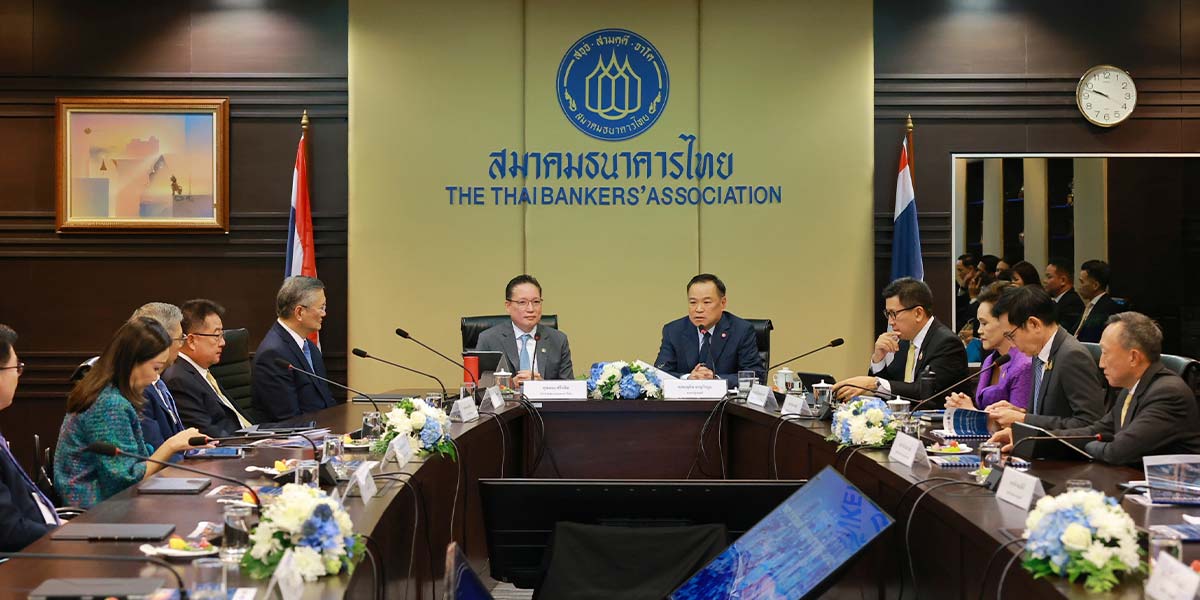On Tuesday (September 22, 2025), Prime Minister Anutin Charnvirakul, together with the economic team, met with the members of Thai Bankers’ Association, led by Mr.Payong Srivanich, President of Krung Thai Bank Public Company Limited (SET: KTB) and the Chairman of the association. Various issues were discussed at the meeting, one of which was the exchange rate of the baht and the mysterious capital inflows under suspicion as “grey capital.”
The Thai Bankers’ Association stated that the issue of the baht exchange rate has raised concerns about the possible involvement of grey capital inflows. The primary action required is to monitor and track whether there are any abnormal inflows and outflows. Dr. Ekniti Nitithanprapas, Deputy Prime Minister and Minister of Finance, stated that the government has already established a team to monitor unexplained foreign exchange flows.
The team will work closely with relevant parties, such as commercial banks, the Bank of Thailand (BOT), the Anti-Money Laundering Office (AMLO), the Ministry of Finance, the Stock Exchange of Thailand (SET), and the Securities and Exchange Commission (SEC), as its mission is to maintain stability of Thai currency. The team is prepared to work at full capacity after the new cabinet is sworn in on September 24, 2025.
This problem is reflected in the abnormally rising Net Errors and Omissions (NEO) in Thailand’s balance of payments. BOT shows that the NEO figure was THB 340.29 billion in 2021 (with a deficit of THB 2.53 billion in 2022). Since 2023, the NEO figure has once again sharply increased to THB 180.40 billion, and in 2024 rose dramatically to THB 530.86 billion, almost tripling from the previous year. In the first quarter of 2025, the NEO stands at THB 80.91 billion. If this trend continues, the full-year NEO for 2025 could reach approximately THB 323.64 billion.
According to balance of payments theory, the balance should always equal the sum of the current account and the capital account, as it follows a double-entry bookkeeping system that must balance all “receipts” and “payments.” In practice, however, it is impossible to completely and promptly capture every transaction, resulting in a discrepancy known as “Net Errors and Omissions (NEO).”
Assoc. Prof. Dr. Anusorn Tamajai, Dean of the Faculty of Economics at the University of the Thai Chamber of Commerce and former member and audit committee of BOT, stated that if the authorities and the BOT cannot explain and understand the rapidly increasing NEO in the balance of payments continuing over the past three years—with discrepancies as high as USD 3-4 billion per quarter (about THB 96-128 billion)—the uncertainty about the origins and destinations of capital inflows and outflows would pose risks to monetary policy, undermining the effectiveness of exchange rate management and failing to address baht volatility properly.
Understanding discrepancies in the balance of payments is therefore crucial, especially as such discrepancies have persisted for 3-4 years and are of considerable size. Whether these inflows and outflows are “grey capital,” involved in money laundering transactions, or merely off-system but lawful transactions, BOT must investigate clearly and supervise as it falls directly in its responsibility. The institute must coordinate with the AMLO and related agencies to urgently resolve these issues.
Reducing net errors and omissions in the balance of payments may be achieved by recording transaction data in a centralized online system and decreasing reliance on survey-based data collection. According to a survey base, bringing most transactions into a centralized online system will make scrutiny easier and enhance transparency.
Many believe that Thailand is a hub for money laundering by transnational criminal organizations or for “grey business.” Thus, relevant authorities must develop legal frameworks, regulatory systems, and mechanisms to prevent Thailand from becoming a money-laundering base. If Thailand aims to become a financial and investment hub in the future, it is necessary to resolve these issues and build confidence.
Ms. Chayawadee Chai-anant, Assistant Governor of the Corporate Relations Group and Spokeswoman for BOT, addressed concerns regarding NEO, stating that regarding whether these will contribute to baht appreciation, data from the past 10 years (2014–2023) indicates that the value of these transactions averages below the average for Asian middle-income countries, which stands at 1.5% of total international trade value, and Thailand’s figure is expected to decrease further if the actual updated data in September is released.
“One reason we see high NEO is that some data flows are rather slow, such as remittance of profits abroad. We do not know the exact amount right away, as we have to wait for actual company disclosures, which could be quarterly or yearly. This causes data delays, so we have to estimate. However, after a data review in September, the figures should decrease,” Ms. Chayawadee said.
The BOT has not yet seen abnormal speculative activity in Thai currency. The baht’s appreciation—which is stronger than the rest of the region—is primarily due to US dollar depreciation, which accounts for around 80-90%. The BOT has stepped in to ensure that the baht’s movement is not excessively rapid or pronounced in either direction, to avoid excessive volatility compared to others and to help domestic entrepreneurs adjust accordingly.





